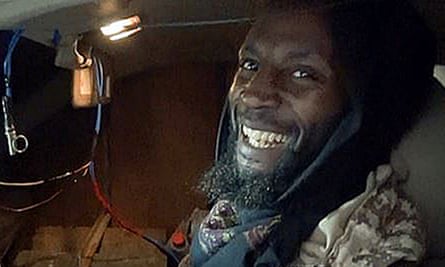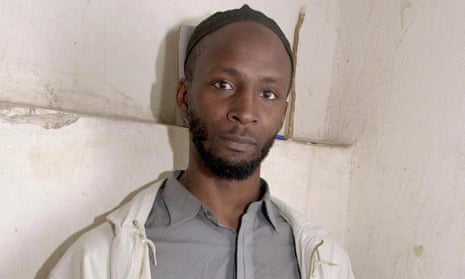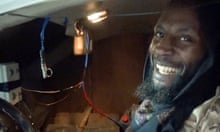When US special forces found Jamal al-Harith in a jail in Kandahar, Afghanistan, in January 2002, he said he viewed them as his saviours. But after another 15 years, two of which he spent in Guantánamo Bay, he was to blow himself up in Iraq on behalf of Islamic State, sworn enemies of the US.
Harith’s Guantánamo file says US officials decided to ship him to Camp X-Ray at the American base in Cuba because “he was expected to have knowledge of Taliban treatment of prisoners and interrogation tactics”. He was soon to learn even more about US methods.
Harith said that during his two years at the US detention camp he was kicked, punched, slapped, deprived of sleep shackled in painful positions, given only meagre rations of water and fed on food marked as up to 12 years past its use-by date. He estimated that he was interrogated about 80 times at Guantánamo, usually by Americans but sometimes by British officials.
He was freed in March 2004. As he and three other British men boarded the RAF aircraft that was to fly them to the UK, they say they were met by a Foreign Office official who asked: “Can you make sure you say you were treated properly?”

In a statement given nine months later, Harith claimed he had never been involved in any terrorist activity. He said: “The irony is that when I was first told in Afghanistan that I would be in the custody of the Americans, I was relieved at that point as I thought that I would then be properly dealt with and returned home without much delay.” He also said that he was still in pain as a result of the beatings he had received before interrogation.
A world away from Afghanistan or Guantánamo in Manchester’s Moss Side yesterday, Harith’s cousin, Trevor Fiddler, said the whole family was in shock at the news. He said he had only seen his cousin once since he returned from Guantánamo. “His dad is very sick now and we all couldn’t quite believe it when we heard it last night,” he said.
The family, he added, had never understood Ronald’s conversion to Islam as they were a “normal Jamaican family” who believed in the “church of God”. Trevor said the family initially believed in Ronald’s innocence and that his incarceration in Guantánamo was unlawful, but now feel he may have deceived them.
“I was surprised when he went that way as the rest of us are all Christians,” he said. “He was just a bit of a silly boy. There was never anything mentally wrong with him – the only thing I can think is that he was brainwashed.
“We never thought he should have been in America in the first place. We all believed him and thought he was telling the truth to us. But now we think he must have been lying and must have been training the whole time for this. It was all a lie.
“We’ve no idea what he did with the money – I mean most of us didn’t even know about it. We think he lied and now we will have to come to terms with what he has done.”
Harith was born Ronald Fiddler in Manchester to devout churchgoing parents from Jamaica in 1966. In his 20s, he converted to Islam – an effort, his sister said, to find peace after a difficult childhood – and began travelling widely in Muslim countries.
In the early 1990s, according to the file the Americans compiled on Harith, he had travelled to Sudan in the company of a senior associate of Osama bin Laden. He also told interrogators he had been to Pakistan, and the Americans suspected he had also been to Saudi Arabia, although he denied it.
But it was while backpacking on a return trip to Pakistan in September 2001 that Harith’s troubles began. He told US forces he had paid a lorry driver to take him to Iran, but he was stopped near the Afghan border by the Taliban. After finding his British passport, they detained him at a jail in Kandahar.
At one point, he and a number of fellow prisoners were forced to share their large cell with a horse that had offended a local Taliban leader in some way.
While the city was being bombed in October 2001, the prisoners were forced to dodge the terrified horse as it clattered around the cell.
When the Taliban regime collapsed the jailers fled, but Harith and a number of prisoners remained at the prison, where they were being fed. It was here that he was discovered by a journalist from the Times, who alerted staff at the newly reopened British embassy in Kabul, believing they would arrange his repatriation.
Instead, Harith was detained by US forces, first at their own detention facility in Kandahar, and then at Guantánamo.
His Guantánamo file, which was among a large cache of documents later passed to WikiLeaks, shows that the camp authorities quickly reached the conclusion that he had no connection with the Taliban or al-Qaida but decided against releasing him because his “timeline has not been fully established”, and because the British diplomats who had seen him at Kandahar had found him to be “cocky and evasive”.
After his return to Britain, Harith was paid £60,000 for a joint interview with the Mirror and ITV describing his ordeal. He also launched a compensation claim against the British government that, it was reported, netted him up to £1m.
But a decade later, in 2014 – and despite his high profile – Harith was able to travel to an Isis-controlled region of Syria. His wife, Shukee Begum, told Channel 4 News the following year that she and her children had followed him there in a failed bid to persuade him to return home. She said she was only able to escape after paying smugglers.
On Wednesday the curtains at Harith’s marital home in the Manchester suburb of Heaton Moor were drawn. His wife did not answer the door of the three-bedroom Victorian house, which the couple bought in 2011.
A neighbour who spoke briefly said Harith had been an arrogant man who did not speak to neighbours. Asked how he spent his £1m compensation from the government, the neighbour said: “It doesn’t seem like the family saw a penny of it. They all live in the same houses and drive the same cars. None of them are flash or anything. They are all just normal people. It’s all so upsetting for them.”








